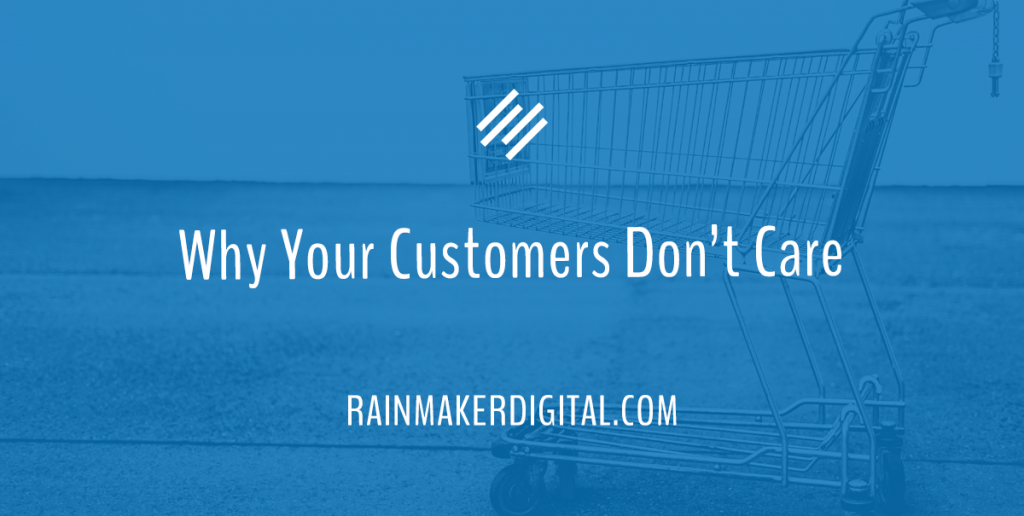
A few years ago I worked with a company that focused on traditional marketing. Fliers and catalogs were how we reached the audience. While I was there, they began to modernize their processes.
There was one problem: no one cared what they had to say anymore.
Their rudimentary social media strategy had focused on pushing products for so long that they’d trained people to ignore them. They didn’t focus on providing value for their audience. And as a result, it took far longer than it should have to get people’s attention online.
There’s a fallacy that all advertising and marketing increases sales. That’s not true. You can actually hurt your brand and curtail your sales by putting out bad content.
Don’t train your customers to ignore you.
Why Your Customers Don’t Care
Would you be friends with a boring narcissist who doesn’t bring any value to your friendship and only ever asks you for favors?
Your customers don’t want that either.
There are three major areas that make your customers ignore you.
Breaking the Customer Contract
Jos. A. Bank was famous for couponing. They built their audience on deep discounts and special offers and regularly blasted their email list with deals.
Eventually their margins fell and they were acquired by Men’s Wearhouse. The new owners got rid of the coupons and the brand was in trouble immediately. Demand cratered. What inventory they had wouldn’t move, and they couldn’t get bodies in stores.
They had trained their audience to expect coupons. When you build your audience with a specific tactic for that long, you create an understood “contract” with them. Jos. A. Bank broke that contract.
The brand is almost dead now. People like me who used to regularly wait for those sales just stopped coming. Jos. A. Bank trained their customers to ignore the brand when they weren’t offering a sale, and when they broke the pattern the business died. Keep the customer contract in mind. Don’t break it or you’ll get ignored.
Making it All About You
Every outbound communication you send needs to put your audience’s needs first. If it’s not a win-win, you shouldn’t send it in the first place.
Win-win marketing happens when you understand your audience’s needs and fill them. You can mine your internal data for insights to know what they look like and care about. You’ll present them with content and offers that really matter to them instead of spamming things they don’t care about. And that means you won’t get ignored.
Take the San Francisco 49ers, for example. Football teams traditionally offered a basic “one size fits all” gift to season ticket holders at the end of the season. Email open rates were at or under 50%. But the 49ers did a little research and decided to offer a wide variety of gifts, allowing the season ticket holders to choose their favorite option. Open rates zoomed over 95%.
Selfish marketing only cares about what the company gets from its customers. Win-win marketing helps both. The secret of good marketing is that a win-win situation is more effective than taking the selfish route.
You can’t make a customer buy no matter how hard you sell. People buy when they’re motivated — by trust, by desire, by fear of missing out. Your job is to tap that motivation. Find a reason for them to care, or they’ll learn to tune you out.
Misusing Hyperbole
“Best.” “Leading.” “#1.”
Along with the word “free”, these are the most powerful words in marketing — and also some of the most misused. How often have you seen products advertised as the “leading” brand and just discounted it because you’ve heard a hundred others say the same thing?
Overuse of hyperbole erodes trust. It creates legal pitfalls. And it can backfire. Misleading claims reflect badly on your company, like the ongoing controversy over oral health claims on sugar-free gum or VW’s “clean diesel” false advertising. People might remember what you say, but they don’t necessarily buy.
Say only what you can prove, and mean it when you say it. Avoid hyperbole. Be specific, honest and truthful and people will listen to what you have to say.
Be a Better Brand
It’s not a death sentence if you’re being ignored right now. But it does require immediate attention.
Make sure you don’t break your customer contract. Learn what your customers really want and give it to them. And step away from hyperbole in favor of concrete claims you can support.
You have to make people want to listen again. It will take effort. But you can turn it around with time, experience and a willingness to change.
Start today. Fix these three areas and build a relationship with your customer based on value — only then will they pay attention to what you have to say. And if you feel like you need a hand fixing your marketing, feel free to reach out. We’re here to help.
Best Regards,
David Brandon
Copywriter
Rainmaker Digital Services